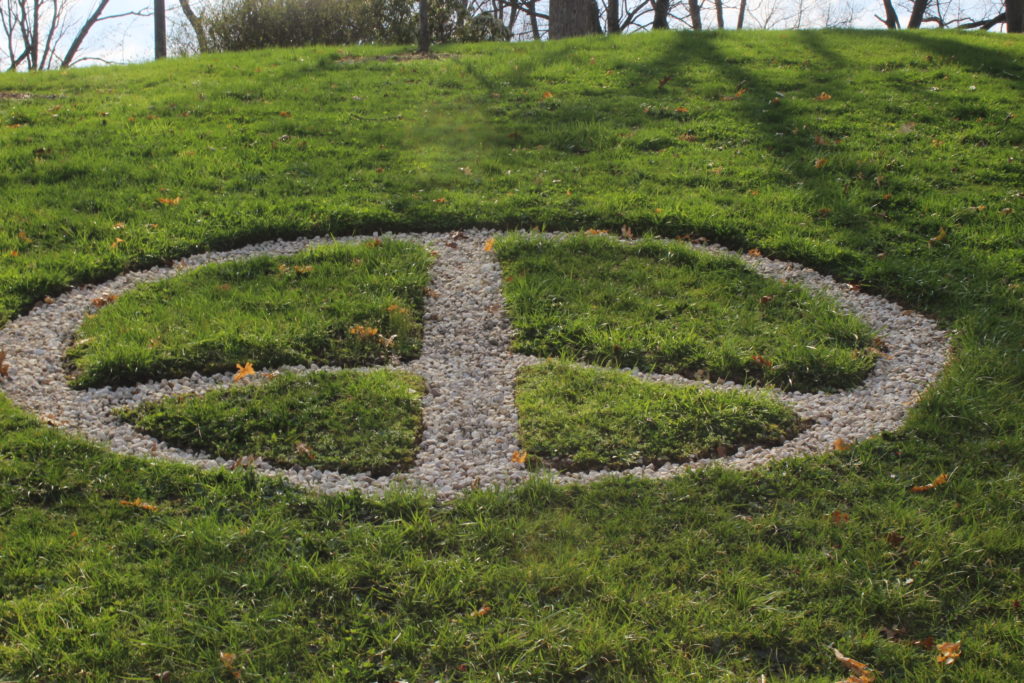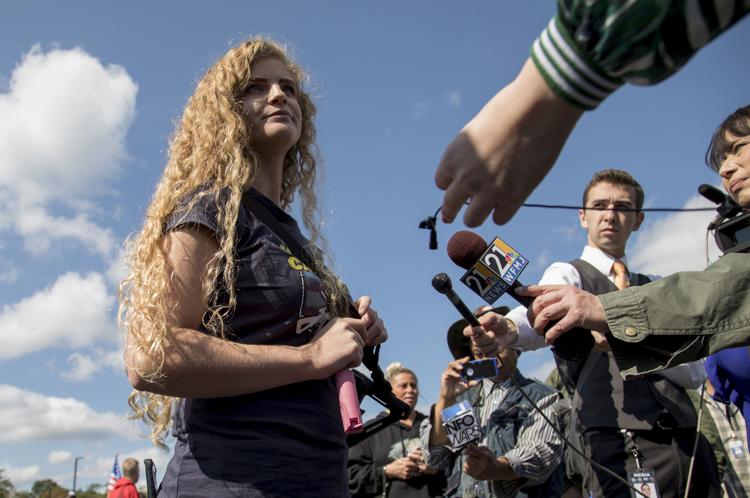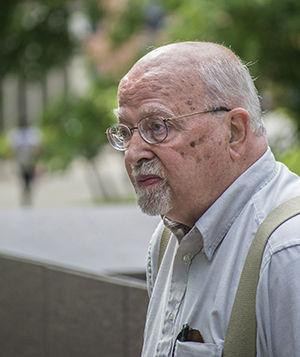Kent State’s campus as a battleground, then and now.
By Tyler Haughn

By Anu Sharma
May 4th, 1970.
A date that forever changed Kent State and American national politics when the Ohio National Guard fired 67 bullets into gathered crowds of Kent State students in 13 seconds, killing four students and wounding nine others. The shooting went on to be recognized as one of the key events that led to the eventual impeachment of President Richard Nixon and the dismantling of the Nixon administration. The event resulted in college students going on strike and forced hundreds of colleges and universities to close nationwide.
Last September, it was an interesting paradox watching Kaitlin Bennett and her student organization, right-libertarian digital media outlet Liberty Hangout, host an open carry rally on Kent’s campus. The fact that one of the biggest rallies on our campus championed arming students with firearms on a campus that made worldwide headlines for its gun violence is something I struggle to understand.

The protests grew extremely tense amid an ever-present police force which intensified the dispute between Bennett and the counter-protestors. Bennett’s original plan was to begin from the Schwartz Center parking lot and walk around campus to encourage discourse about open carry laws in Ohio and why she and her supporters believe they should be allowed to carry their firearms on Kent’s campus. The presence of student counterportestors, the Cleveland chapter of Black Lives Matter and Antifa all led to heated confrontations during the rally and caused the the hundreds of police officers tasked with maintaining safety to don their riot gear. The university spent $65 thousand on security measures for the event. Fortunately, there were no serious injuries sustained during the rally as four individuals were arrested in total.
I am still conflicted in how I feel about Bennett’s rally and the tension it brought to a campus that has already endured trauma inflicted by gun violence. Was Bennett following through with the planned open carry walk to exercise her right of free speech and to advocate for an issue that she have every right to be passionate about? Or was she performing this act because she knew how much attention the university, its students and the media would give to Liberty Hangout, increasing their exposure along the way?
The fact that one of the biggest rallies on our campus championed arming students with firearms on a campus that made worldwide headlines for its gun violence is something I struggle to understand.
– Tyler Haughn
It is difficult to learn about May 4th and not feel disturbed by the events of that tragic day. Four students were murdered while voicing their disagreement with the government’s decision to invade Cambodia and continue the Vietnam War efforts. Allison Krause, Jeffrey Miller, Sandra Scheuer and William Schroeder lost their lives while engaging in a democratic nation’s most important liberties: freedom of assembly and freedom of speech.
Jerry M. Lewis, professor emeritus of sociology, witnessed the senseless violence on May 4th. Lewis first came to Kent State in the Fall of 1966 and taught as a sociology professor here until 1996. He earned his bachelor’s degree from Cornell College, his master’s degree from Boston University and his doctoral degree from the University of Illinois.
“Eight or ten guardsmen turned together and fired, and I had been in the army, so I knew they were firing real bullets, so I dove to my right behind some bushes. I started running around Prentice Hall parking lot yelling, “we must leave, these are real bullets.”
– Jerry M. Lewis
Lewis still comes to Kent’s campus to give lectures about May 4th and provide insight into what transpired that day. During his career teaching at Kent State, Lewis served as a faculty marshal and was in charge of protecting students when they first began protesting on May 1st in the buildup to the planned rally that was scheduled for May 4th.

Lewis said many students believed the guardsmen were firing blanks in an attempt to disperse the gathered crowds. Lewis immediately understood the shots fired were real bullets capable of taking students’ lives. “Eight or ten guardsmen turned together and fired, and I had been in the army, so I knew they were firing real bullets, so I dove to my right behind some bushes,” Lewis said. “ I started running around Prentice Hall parking lot yelling, “we must leave, these are real bullets.”
Lewis said the rally was nonviolent and should not have been met with such violent measures. He believes the unprovoked shootings were a direct violation of the student’s first amendment rights.
“The National Guard were agents of the state of Ohio, and consequently agents of the United States, and they broke up a rally that had a perfect right to go on,” Lewis said. “There was shouting and profanity but other than that it was a very peaceful rally. It took away from students a legitimate right to protest the invasion of Cambodia, the right of assembly and the right of freedom of speech, which is essential to the survival of democracy.”
Lewis said many students today do not understand the impact May 4th forever had on not only Kent State but higher education as a whole.
“I think most of the students now have brochure knowledge, they have maybe been to the visitor’s center or seen the film, but don’t have the depth and knowledge that the students who went through it have,” Lewis said. “Many students who go through the visitor’s center do not realize the scope of the impact May 4th had on American higher education. There were responses all over the world to May 4th.”
Lewis said universities are places where education should be the most important priority of the students and faculty. He believes this is jeopardized when students do not feel safe on their campus.
“On a personal level, independent of May 4th, people do not need to carry a gun onto a college campus,” Lewis said.
Lewis has played an instrumental role in ensuring Kent State preserves the remembrance of May 4th and its symbolism for freedom of speech. He said Kent State has respected the memory of all who witnessed and endured the shootings by planning and hosting the annual commemoration, vigil walk, visitor’s center, archives and giving students time off on May 4th.
“In general, I think Kent State has been very responsible in responding to the demands of society,” Lewis said. “Society says, “Kent State, do something about remembering May 4th.””
Michael Heil, president of Liberty Hangout, believes students should be able to carry firearms on Kent State’s campus because it is their property. Ohio law permits open carry on public property, including public universities, though firearms aren’t allowed inside campus buildings. Kent State students and staff are not permitted to possess firearms on campus. KSU’s policy says that “students, staff, faculty and third parties doing business with the university are…prohibited from possessing, storing or using a deadly weapon while outside on university grounds, that is owned, operated or leased by the university.”
“If they are legally able to acquire them already then they should be able to do that on campus as well,” Heil said. “It is your right, and nobody should be able to tell you not to be able to defend yourself.”
Heil pointed out it was not a citizen but the government who committed the shooting and believes if the students present that day were armed, they would have stood a better chance in avoiding any casualties.
“If the government knew that the group of students that day was armed, I think they would have been a lot more hesitant before they fired into that crowd,” Heil said. “An armed society is a safe society.”
Heil believes May 4th and its aftermath should not be cited as a reason to ban current Kent State students from carrying their own firearms across campus.
“I’ve always looked at May 4th with the view of the government overstepping,” Heil said. “Our organization looks at it as an unfortunate tragedy that didn’t need to happen and is just another example of why big government is not good.”
Maddie Camp, the current student chair of the May 4th Task Force, said the May 4th Task Force strives to remind students and the general public the importance of activism. The task force is an on-campus organization founded by Kent State students in 1975 in direct response to Kent State’s refusal to sponsor annual programs designed to commemorate the events and victims of May 4th.
“I do think the history of May 4th creates suspicion and anxiety towards guns, maybe more so than on other college campuses. In the lens of May 4th, students were just throwing rocks that day and even at the time of the shots, there were no rocks or projectiles being thrown, and 4 students were murdered, so add more guns into that equation and I don’t think it equals fewer casualties.”
– Maddie Camp
“It is about preserving the legacy and memory of the students who lost their lives that day and the students whose lives were altered forever but also preserving the legacy of activism,” Camp said. “The task force has always been an activist organization bringing up issues of the times.”
Camp said if the student protestors carried firearms on May 4th, there would have been more death. In her experiences, the unique history of May 4th and its historical relationship with firearms has shaped the current student body’s views of gun violence. “I do think the history of May 4th creates suspicion and anxiety towards guns, maybe more so than on other college campuses,” Camp said. “In the lens of May 4th, students were just throwing rocks that day and even at the time of the shots, there were no rocks or projectiles being thrown, and 4 students were murdered, so add more guns into that equation and I don’t think it equals fewer casualties.”
The notion that more guns equals greater safety is a common belief among many Americans, as a recent poll conducted by NBC News and the Wall Street Journal indicates that around 58% of Americans agree with the statement that “gun ownership does more to increase safety by allowing law-abiding citizens to protect themselves.” Only 38% agree with the statement that “gun ownership does more to reduce safety by giving too many people access to firearms and increasing the chances for accidental misuse.”
A 2014 study published in Annals of Internal Medicine concluded that higher accessibility to firearms tripled the risk of suicide and doubled the chances of a homicide being committed. The claim that 2.5 million Americans every year use firearms to protect themselves or their property has repeatedly been refuted. The skewed numbers were based off of an inconsistent 1990s study. Rather, there is overwhelming evidence that more guns results in more risk for everyone involved. An analysis led by the FBI in 2015 concluded that “”private citizens are far more likely to use guns to harm others or themselves than to use them to kill in self-defense.”
The evidence leaves me inclined to strongly believe that had the students wielded firearms on May 4th, this would have only increased the number of deaths and reduced the safety of all participants.
Camp said May 4th encompasses so much more than just what happened on that day. It is representative of students and their right to peacefully protest.
“The legacy of May 4th is a living legacy; it is always changing and is consistent with the times,” Camp said. “It changes to whatever is going on in that time.”
Eugene Shelton, co-chairman of the diversity and globalization committee for the School of Journalism and Mass Communication and an associate professor, clearly remembers sitting in his dorm room inside of Wright Hall on May 4th, where he could see everything unfold from his window. Shelton said Jeffrey Miller, one of the four students who lost their lives that day, stayed in Wright Hall too.
“A young man who I lived in the same dorm with was murdered,” Shelton said. “So that was an emotional attachment.”
Shelton said guns should not be allowed on any college campus, particularly Kent State’s considering its connection to May 4th and the vulnerability of college students.
“I don’t want guns in my life, period,” Shelton said. “Why do you need to carry a gun? Yes, it is a right but when you see innocent people being killed on a daily basis in the most innocent of places like schools or churches, I don’t understand why people say what is more important—somebody’s life or my right to bear arms?”
Shelton believes there is too much accessibility to firearms throughout the United States, resulting in less gun regulation and increasing the chances of an individual acquiring a firearm who should not be allowed to possess the weapon in the first place. Last year alone, there were nearly 40,000 deaths as a result of gun violence, marking the third consecutive year firearm deaths rose in the United States.
“It’s too easy for a person who is mentally disabled to get guns and their minds operate in a different world,” Shelton said. “Too many people who have had access to guns should not have had them in the first place.”
Alexis Atwater, president of Kent State college democrats and chief of staff for undergraduate student government, said May 4th demonstrates the need for college students to share their opinions about issues that affect them.
“The legacy shows students should have a voice. Whether it be to administration, state politics, national politics,” Atwater said. “It is so important students have a voice because these things do impact them.”
Atwater said many Kent State students, particularly out of state students, do not understand what really happened on May 4th and only know basic facts surrounding the tragedy.
“Yes, we want to be remembered as a school where something happened, because it’s important to remember but also to educate,” Atwater said. “We should keep bringing speakers here and doing the vigil every year. I think it’s important to remember and I don’t want to see it decline.”
Atwater believes police and other security measures should consider how peaceful the majority of protestors wish to be during campus protests and demonstrations.
“There are people on the left and on the right that get pretty extreme and protest in the wrong way and don’t go about things peacefully, but the majority do and that is what we need to see,” Atwater said. “It’s so important to share your voice.”
I agree that it is important to share your voice. As a college student and a senior at Kent State, the history of May 4th absolutely shakes me to my core. These four students prematurely lost their lives in this senseless act of violence while practicing their constitutional rights to express their personal views, which are protected by the First Amendment. During the open-carry protests, what if shots were fired at my fellow Kent State peers, regardless of whether or not they support open carry on campus, who had every right to assemble and protest? As college students, we are the intellectuals of the future. We equally possess the constitutional right to share our personal views on any contemporary political issue. We should be able to do so without fear of aggressive retaliation.
In remembrance of Allison Krause, Jeffrey Miller, Sandra Scheuer and William Schroeder.